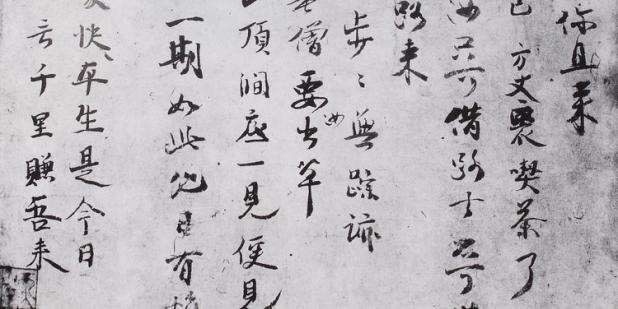Join us for a free one-day workshop for educators at the Japanese American National Museum, hosted by the USC U.S.-China Institute and the National Consortium for Teaching about Asia. This workshop will include a guided tour of the beloved exhibition Common Ground: The Heart of Community, slated to close permanently in January 2025. Following the tour, learn strategies for engaging students in the primary source artifacts, images, and documents found in JANM’s vast collection and discover classroom-ready resources to support teaching and learning about the Japanese American experience.
Horizons of (Mis)communication between Chinese Chan and Japanese Zen
A talk by Prof. Jason Protass (Brown University).
Where

A talk by Prof. Jason Protass (Brown University).
Buddhism flowed between the Chinese continent and Japan – by Japanese pilgrims, Chinese émigré monks, merchants, texts and other objects. This is often described as a transmission from China to Japan. However, from diaries, travelogues, manuscripts, and hagiographic writing of the 11th to 14th centuries, we also learn that Japanese and Chinese monks frequently could not use spoken communication with each other. Even many erudite Gozan Zen monks, competent writers of metered-and-rhymed kanshi (“Sinitic poetry”), could not understand spoken Chinese. Instead, acts of translingual communication relied upon: (a) third party interpreters; (b) written “brush talk” 筆談 (J. hitsudan; Ch. bitan); or (c) body language. This lecture will discuss evidence for these forms of communication, and illustrate the horizons and possibilities of misunderstanding. I will argue that some foundational insights were reached precisely through miscommunication. I will also suggest that certain kinds of misunderstanding may play an essential role in creativity and interpretation. Overall, this may provide us an opportunity to rethink how we describe the relationship between Japanese Zen and Chinese Chan.
Bio
Jason Protass is Assistant Professor of Religious Studies at Brown University. A scholar of Chinese Buddhism, he worked with Japanese Sinologists in Kyoto and earned his PhD from Stanford in 2016. He has published on Buddhist poetry, and the use of digital humanities in the study of Chan institutional history.
Sponsored by the USC Shinso Ito Center for Japanese Religions and Culture.
Featured Articles
Please join us for the Grad Mixer! Hosted by USC Annenberg Office of International Affairs, Enjoy food, drink and conversation with fellow students across USC Annenberg. Graduate students from any field are welcome to join, so it is a great opportunity to meet fellow students with IR/foreign policy-related research topics and interests.
RSVP link: https://forms.gle/1zer188RE9dCS6Ho6
Events
Hosted by USC Annenberg Office of International Affairs, enjoy food, drink and conversation with fellow international students.
Join us for an in-person conversation on Thursday, November 7th at 4pm with author David M. Lampton as he discusses his new book, Living U.S.-China Relations: From Cold War to Cold War. The book examines the history of U.S.-China relations across eight U.S. presidential administrations.




